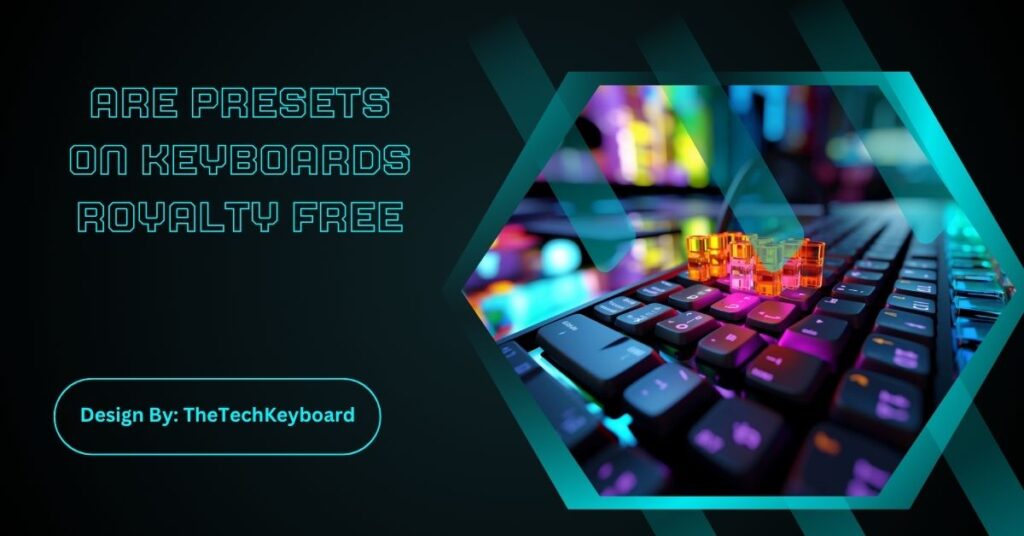Most keyboard presets are royalty-free for music production, allowing use in songs and performances. However, reselling, redistributing, or re-sampling these sounds without permission typically violates licensing agreements and is not allowed.
In the modern world of music production and digital composition, keyboard presets have become a standard tool for musicians, producers, and hobbyists. From synth patches to sampled pianos, these presets allow for creativity and convenience—but they also raise an important legal and ethical question: Are presets on keyboards royalty free?
Understanding the royalty rights tied to preset sounds is crucial, especially if you’re releasing music commercially. In this guide, we’ll break down what presets are, how copyright applies to them, and when you may or may not need a license.
What Are Keyboard Presets?
Keyboard presets are pre-loaded or downloadable sound settings on digital keyboards, synthesizers, and workstations. These include:
- Synth patches
- Drum kits
- Orchestral samples
- Effects (like reverb or distortion settings)
- Soundscapes and loops
They’re designed to help you create music quickly by providing ready-made tones—eliminating the need to design sounds from scratch.
Understanding Royalty-Free Explained

“Royalty-free” means you can use the content (in this case, a preset) without paying ongoing royalties or fees for its use in your own work. However, this doesn’t always mean the content is completely free to use for any purpose.
There are two main categories:
- Commercial royalty-free: You can use the sound in released music, videos, games, etc.
- Personal or demo-use only: You can use the sound at home, but not for commercial distribution.
Always check the End User License Agreement (EULA) of the product.
Are Presets On Keyboards Royalty Free?
The short answer: Most presets on keyboards are royalty free for music production, but not for resale, redistribution, or re-sampling.
✅ You Can Usually:
- Use presets in your songs or performances
- Monetize those songs via YouTube, Spotify, etc.
- Use them in commercial videos, podcasts, or games
🚫 You Can’t Usually:
- Sell or share the preset itself
- Sample the preset and sell it as part of a sound pack
- Use it as your own intellectual property
What Do Major Brands Say About Presets?
🎹 Yamaha
Yamaha generally allows users to use keyboard sounds in compositions royalty-free. However, you can’t sample and sell those sounds.
🎹 Roland
Roland’s license permits preset usage in original music, but again prohibits re-packaging or direct resale of the sounds.
🎹 Korg
Korg presets can be used freely in commercial and non-commercial recordings, but the actual samples remain Korg’s intellectual property.
🎹 Native Instruments / Komplete Keyboards
Presets and libraries are royalty free for musical use, but redistribution in sample packs or as-is is forbidden.
Always check the EULA on the brand’s official website for your specific product.
Why the Confusion?
Many musicians assume “if I paid for it, I can use it however I want.” But that’s not always the case. Purchasing a keyboard gives you a license to use the sounds, not ownership of the sounds themselves.
Just like buying software or a movie doesn’t give you distribution rights, the same applies to keyboard presets.
What About Sampling a Preset?
If you record a single note or phrase from a preset and resell it as part of a sample pack, that’s generally a violation of the license. However, if you use the preset within a musical composition, such as a beat or full song, and transform it creatively, you’re usually in the clear.
Tips to Stay Legally Safe
- Read the EULA Carefully: Every product has its own license agreement. What’s allowed on one keyboard might be forbidden on another.
- Avoid Selling Raw Sounds: Don’t extract and sell sounds from your keyboard—even if you “tweaked them a little.”
- Create Original Compositions: Use the presets as tools in your songs. Don’t rely on them as standalone audio files.
- Don’t Repackage Presets: Reselling or sharing the exact same presets (especially from factory sound banks) can get you in legal trouble.
- Check with the Manufacturer: When in doubt, reach out to the keyboard manufacturer for clarification.
Examples of What You Can and Can’t Do
| Action | Allowed? | Notes |
| Use a keyboard preset in your song | ✅ Yes | As long as it’s part of an original track |
| Upload that song to Spotify or YouTube | ✅ Yes | Commercial release is allowed |
| Sell the preset as part of a sound pack | ❌ No | This violates most license agreements |
| Resample a preset note and sell it as a loop | ❌ No | Not transformative enough to be legal |
| Modify the preset and use it in your beat | ✅ Yes | Creative use is encouraged |
Royalty-Free vs. Licensed Sample Packs

Many keyboards now offer downloadable expansion packs, and the same rules apply:
- If marked royalty-free, you can use them in music.
- If marked for demo or educational use, don’t release them commercially.
If you buy packs from third-party vendors (like Splice or Loopmasters), double-check their licensing too—most are safe for commercial use.
Does It Matter for Independent Artists?
Yes! Even indie musicians and small producers should respect these rules. Platforms like YouTube and Spotify can detect copyrighted content using automated systems. You might face:
- Content takedowns
- Monetization loss
- Legal complaints
It’s always better to stay on the safe side—even for hobbyists.
FAQs:
1. Can I use keyboard presets in commercial music releases?
Yes, most manufacturers allow you to use their presets in original music for commercial purposes, such as streaming or album sales, as long as the preset isn’t being resold or redistributed by itself.
2. What happens if I sample a keyboard preset and sell it as part of a pack?
That’s usually a license violation. Even if you slightly alter the preset, reselling or distributing it in sample packs is not allowed unless the license explicitly permits such use.
3. Do all keyboard brands offer royalty-free presets?
Most major brands like Yamaha, Roland, and Korg offer royalty-free use for compositions, but they don’t allow preset redistribution. Always check the brand’s EULA or licensing terms for each product.
4. Can I share modified presets with friends or online communities?
Sharing modified versions of factory presets is typically not allowed unless the license permits it. Some manufacturers allow personal sharing, but commercial or public distribution often breaches licensing terms.
5. Are free or demo presets on keyboards safe to use in monetized projects?
Not always. Demo presets may come with limited-use licenses and may not be cleared for commercial use. Always read the license to ensure you can use them in revenue-generating projects.
Conclusion:
Keyboard presets are excellent tools for creating professional music, and most are royalty-free for use in compositions. However, the key rule is to use them within your original work—not to resell or redistribute the sounds themselves. Respecting licensing agreements protects both the musician and the original creators of the sounds. Whether you’re a producer, performer, or hobbyist, always review the EULA of your keyboard to stay legal, ethical, and free from future copyright issues. Use presets creatively, not commercially.


